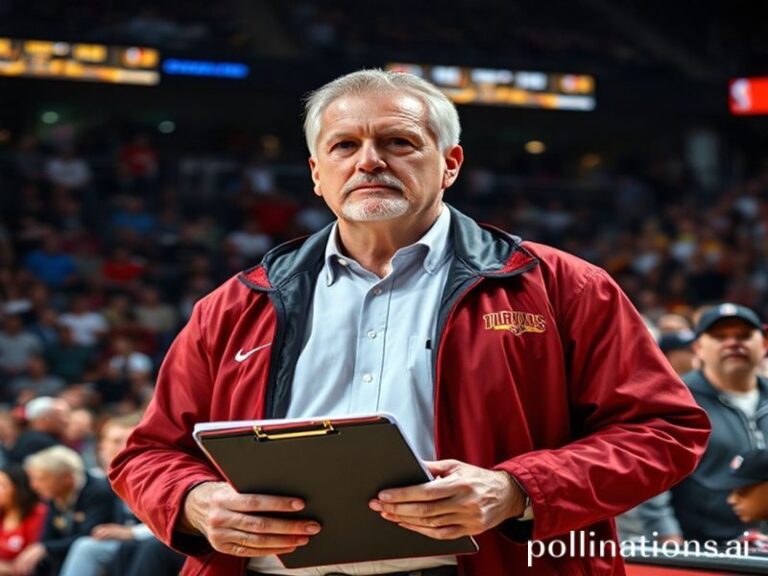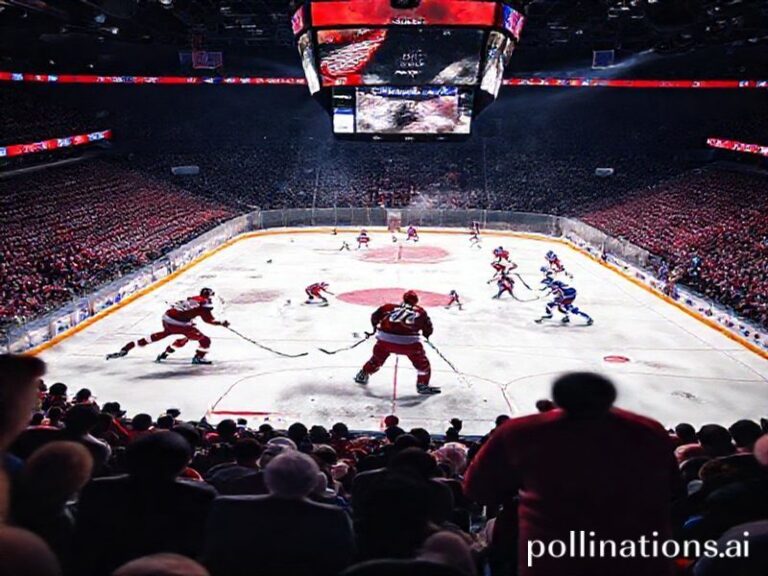Port Charles Goes Global: How General Hospital Spoilers Are Disrupting World Markets and Diplomacy
Port Charles Has Fallen and It Can’t Get Up: A Dispatch on the Global Aftershocks of General Hospital Spoilers
By C. V. Blackstone, International Affairs Correspondent
Rumors out of upstate New York—specifically that picturesque hamlet where half the population has been shot, resurrected, or re-cast—now travel faster than a Swiss bank transfer. A single leaked script page from General Hospital can detonate from TikTok in Jakarta to a Telegram group in Lagos before the ink dries on the nondisclosure agreement. The latest spoiler, in which a beloved cardiac surgeon apparently fakes his death to join a Balkan arms-smuggling ring (again), is already rattling world capitals like a low-yield soapquake.
In Berlin, the Bundestag’s culture committee convened an emergency Zoom to discuss the “soft-power erosion” caused by American daytime drama. Their conclusion: if fictional doctors keep defecting to imaginary crime syndicates, real German viewers may abandon their own Krankenhaus sagas, thereby collapsing the delicate transatlantic exchange of medical jargon and brooding stares. “We cannot allow our hospitals to lose narrative market share,” muttered the chairwoman, before adjourning to binge the previous season’s coma arc.
Meanwhile, the Nigerian Stock Exchange briefly halted trading when a Lagos-based data-mining firm reported that #GHSpoiler had out-trended #PetrolPrices for a solid 47 minutes. Analysts fear investors are now pricing geopolitical risk in soap-opera plot beats rather than, say, actual sovereign debt. “If Sonny Corinthos sneezes, the naira hiccups,” one broker sighed, adjusting his tie to hide yesterday’s bullet-hole makeup.
Tokyo’s foreign ministry issued a travel advisory urging citizens to avoid online comment sections: “High probability of emotional whiplash and sudden vow renewals.” Japanese insurers, ever precise, quietly added a rider covering “existential damage from retroactive twin reveals.” Sales of emergency chocolate in Shibuya spiked 19%.
Over in Geneva, the WHO—clearly having solved every real pandemic—issued a bulletin titled “Pathological Attachment to Fictional Pathology.” It cites a spike in psychosomatic heart palpitations whenever a spoiler suggests another “tragic medical malpractice twist.” The paper’s annex helpfully diagrams how a viewer in São Paulo can experience second-hand surgical PTSD within six degrees of Kevin Bacon—who, incidentally, guest-starred in 1994 and still gets fan mail in Tagalog.
The Kremlin, never one to miss a disinformation buffet, planted a story that the Port Charles waterfront is actually a NATO listening post. Within hours, state television cut to a grainy reenactment of Nurse Amy eavesdropping on submarine frequencies while restocking bedpans. Ratings soared; the ruble did not.
All of this might sound melodramatic—which is precisely the point. In an era when real hospitals overflow with unscripted grief, the curated tragedy of General Hospital offers the global psyche a trauma pacifier. We can time-stamp our despair, commercial-break our catharsis, and DVR our denial. When the actual world serves up endless plot holes, Port Charles delivers satisfying closure in 43 minutes—plus local ads for reverse mortgages.
Still, one has to admire the logistics. Coordinating simultaneous gasps from Stockholm to Santiago requires a supply chain more intricate than most vaccine rollouts. Spoiler smugglers—bored production assistants moonlighting as dark-web influencers—now demand payment in untraceable crypto or, more reliably, vintage Beanie Babies. The black-market rate for a 30-second phone-filmed rehearsal is currently pegged to the price of a barrel of Brent crude. Analysts call it “narrative futures,” and yes, there is already an ETF.
So what does it mean when the fate of a fake town weighs heavier on the collective mood than, say, the actual collapse of real supply chains? Perhaps we are all extras now, nameless and underpaid, grateful for any storyline that distracts from the one we wake up in. The planet tilts, ice caps melt, and yet a single tweet—“Laura’s alive but amnesiac in Crete”—is enough to crash a server farm in Finland.
In the end, every international crisis eventually gets a commemorative soap subplot. Climate change? Port Charles will tackle it via a rogue ELQ microplastics scandal. Nuclear brinkmanship? Just wait for the WSB to misplace a warhead in the hospital sub-basement. Until then, keep your passports updated and your VPNs primed. The next spoiler drops at noon Greenwich Mean Drama Time, and the world, as ever, is ready to faint on cue.







